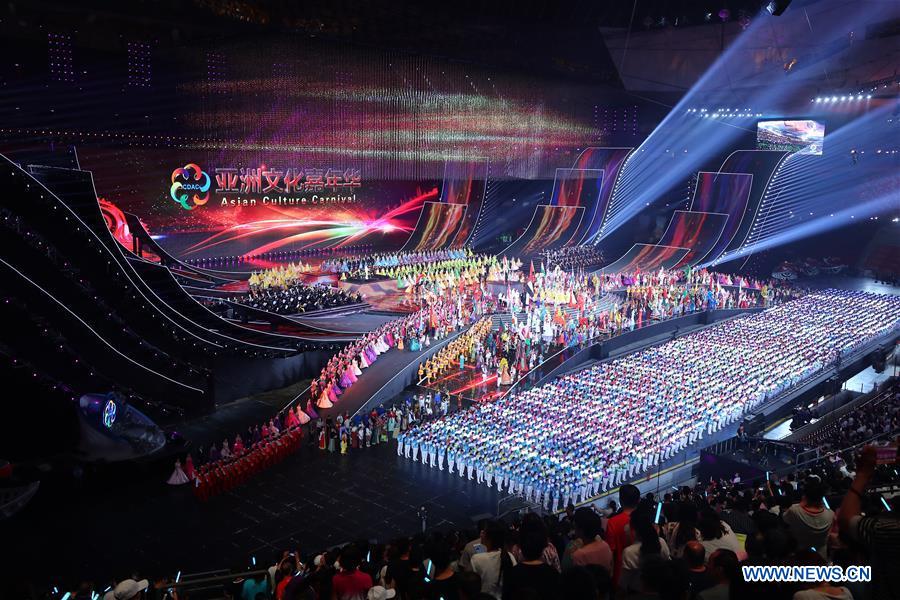CDAC's message can go even beyond Asia
- By George N. Tzogopoulos
 0 Comment(s)
0 Comment(s) Print
Print E-mail China.org.cn, May 22, 2019
E-mail China.org.cn, May 22, 2019

The Conference on the Dialogue of Asian Civilizations (CDAC) is an original platform to foster cooperation among the different countries of Asia, and its discussions on culture – either ancient or modern – can contribute towards better understanding among its members. The importance of Asia as a continent is evident in its numbers: Asia encompasses 1/3 of the earth's landmass and 2/3s of the world's population. The more that dialogue is facilitated, the better it is for Asian countries to adopt a constructive approach to drive and improve their relations with each other.
Giving the keynote address at the CDAC, President Xi Jinping offered a new way of thinking about international affairs. He challenged the "clash of civilizations" theory, and said a community with a shared future can be created in Asia. In proposing this, he elaborated on the necessary conditions to create such a future. They included mutual respect and treatment of others as equals, enrichment of the unique beauty of different nations, adopting openness, inclusiveness and constant advancement to keep pace with the times.
China's ultimate goal for Asia remains a combination of prosperity and peace as both are closely interlinked. The lack of basic goods might well be a key reason for insecurity leading to eruptions of violence, and when conflicts break out, development is interrupted and progress is reversed. In 2014, Xi spoke about the threat of terrorism, extremism and separatism. Energy and cyber-security as well as organized crime and drug trafficking also add to existing challenges, which require joint responses by different nations.
Several patterns, fora and foreign policy instruments can further foster broad-based consultations in Asia to achieve prosperity and peace. These include the China-ASEAN Strategic Partnership, the Asia-Pacific Economic Cooperation, the Asia-Cooperation Dialogue, the Greater Mekong Sub-region Cooperation, the Shanghai Cooperation Organization and the Asia Investment and Infrastructure Bank, which all mirror the common will to build synergies among participants and stakeholders. Above all, the Belt and Road forum initiative has been a successful integration mechanism that intersects with other projects such as the Eurasia Economic Union.
The Asian culture carnival held in Beijing after the CDAC opening ceremony is itself a harmonious blend of differences. It is this harmony that should be expanded in the sphere of economic and foreign policies. The creation of a community with a shared future for Asia is not an easy task and requires time, patience, greater participation and more public support. But the heroic efforts of the Chinese government to alleviate poverty in parallel with brokering reconciliation in the Korean Peninsula demonstrate that ways could be opened. Mutual learning and exchanges contribute to this end. Symbolically, the organization of the 2020 Olympic Games in Tokyo and the 2022 Winter Olympic Games in Beijing should remind all Asians of the importance of the Olympic ideals. This process began last year with the 2018 Pyeongchang Winter Olympics.
Although the focus of the CDAC is on Asia, its message is in essence, global. It believes that civilizations have no borders and their unique beauty should be shared by everyone, as indicated by the participation of the Greek President Prokopis Pavlopoulos in the event. As the cradle of democracy, Greece does represent an ancient civilization and welcomes relevant initiatives. The concept of the CDAC can thus be promoted in Europe. In the modern era of globalization, prosperity and peace cannot be exclusive to a select few countries or continents. Even if the 21st century belongs to Asia as some commentators suggest, a zero-sum logic is not applicable any longer. The interests to be considered should be the interests of all.
According to a Chinese proverb, "a single flower does not make spring, while one hundred flowers in full blossom bring spring in the garden." In the aftermath of the CDAC, it is now other countries' turn to break new ground and come up with creative ideas in their interaction with China.
The CDAC was a success, and its continuity – through successive rounds of dialogue – will guarantee its further improvement and a fruitful future impact. By forging cooperation among different civilizations, China will build closer ties with other countries, who in turn will have the opportunity to learn more about China.
George N. Tzogopoulos is a columnist with China.org.cn. For more information please visit:
http://www.china.org.cn/opinion/GeorgeNTzogopoulos.htm
Opinion articles reflect the views of their authors, not necessarily those of China.org.cn.
If you would like to contribute, please contact us at opinion@china.org.cn.






Go to Forum >>0 Comment(s)